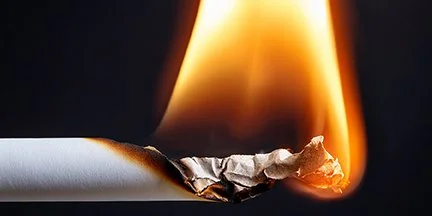THE PAPER AND THE FLAME
A Devotional on Holiness and the Nature of Redemption
Blessed are You, Lord our God, King of the Universe, who sanctifies us by Your Word and transforms our nature through Your Son.
Imagine a candle and a sheet of paper.
The candle’s flame is pure and unrelenting. The paper is fragile and flammable. If you try to bring them together, the paper will burn. The fire cannot change—it would cease to be fire. But the paper can change. You could soak it in water, laminate it, turn it into something less easily consumed. Only then can it withstand the flame.
This is how holiness works.
God is a consuming fire (Deuteronomy 4:24). He does not diminish His holiness to make room for our impurity. He cannot change His nature. But we can be changed. And in Messiah, we are.
The Puzzle of the Red Heifer
In Numbers 19, God commands Israel to sacrifice a perfect,
unblemished red heifer—an extremely rare animal. The heifer
was burned entirely, along with cedar wood, hyssop, and scarlet
wool. The ashes were gathered and mixed with water to create
a purification solution. This water was sprinkled on anyone who
had come into contact with a dead body—restoring their ritual
purity.
But here’s the paradox:
The mixture purified those who were unclean.
Yet those involved in preparing it—the priest and the one
who burned it—became unclean themselves.
It is one of the most mysterious commands in Torah. Even King Solomon, wisest of all, said he could not fully grasp it.
This ritual shows us that the solution to impurity doesn’t come from logical means. It comes through substitution, through paradox, through sacrifice that takes on our defilement.
It points forward—to something greater.
Yeshua and the Changed Nature
Yeshua is the fulfillment of this strange statute.
He, like the red heifer, was taken outside the camp (Hebrews 13:11–12).
He, like the sacrifice, bore the cost of our impurity.
He changes not only our status—but our nature.
We are not merely forgiven—we are transformed. The parts of us that once could not stand in God’s presence are made holy.
Like paper soaked in water, we are no longer flammable.
We remain human—but no longer combustible.
We are still ourselves—but fundamentally changed.
What This Means for You
God does not ask His fire to burn less brightly. He does not reduce His glory to meet us in our brokenness. He changes us. Not by erasing who we are, but by re-creating us in Messiah. As Paul wrote, “If anyone is in Messiah, he is a new creation” (2 Corinthians 5:17).
We can now approach the flame without fear—not because the fire is any less fierce, but because we have been made new.
Reflection Questions
What parts of your life still feel flammable—unable to survive the presence of God?
Have you been trying to stand before God without letting Him change your nature?
How does it change your understanding of salvation to think of it as transformation rather than just pardon?
Scriptures for Meditation
Deuteronomy 4:24 – “For the Lord your God is a consuming fire.”
Numbers 19:1–10 – The statute of the red heifer
Hebrews 9:13–14 – Messiah’s blood purifies our consciences
Hebrews 13:11–12 – Yeshua suffered outside the camp
2 Corinthians 5:17 – “If anyone is in Messiah, he is a new creation”
Live It Out
Try this simple act:
Write something you’re struggling with—a fear, a failure, or a sin—on a piece of paper. Instead of burning it, bury it in soil. This symbolizes not destruction, but transformation—what God does with those who surrender to Him.
He doesn’t just forgive the paper.
He changes it.
And in doing so, brings it safely to the fire.



